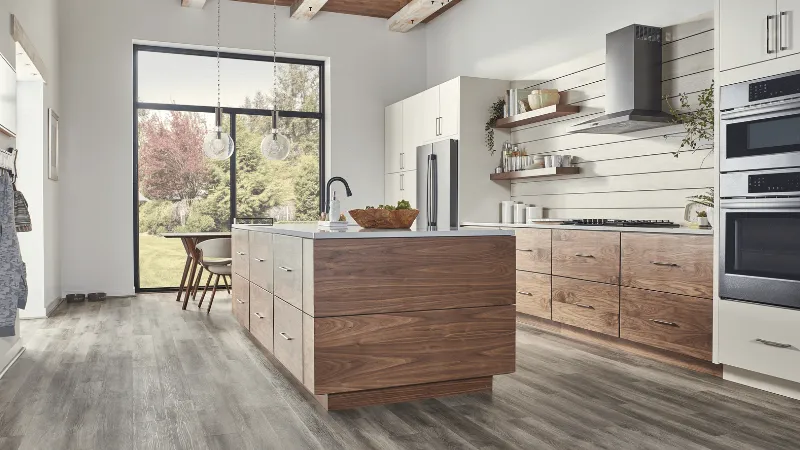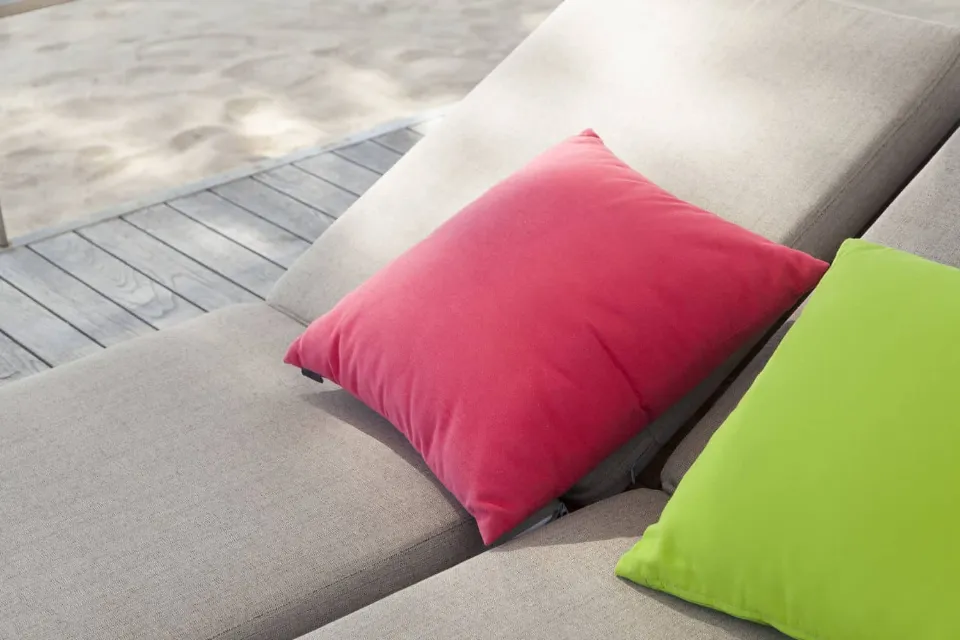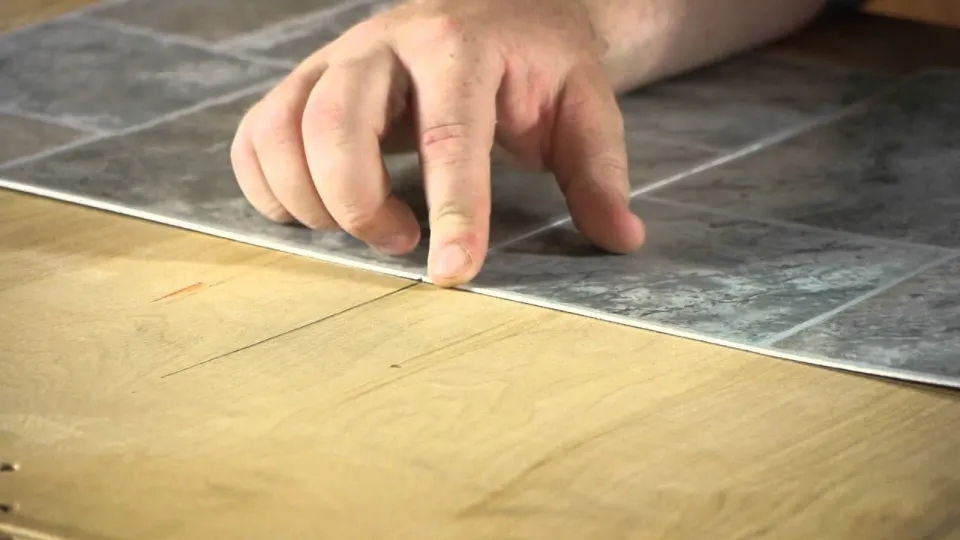Engineered Hardwood Vs. Vinyl Plank Flooring: which one is better for you? In this post, we’ll examine each of these flooring options based on a variety of crucial flooring criteria to assist you in making your final decision. Let’s get started!
Engineered hardwoods — which cost less than solid hardwood and have a wooden top layer — are somewhat moisture tolerant. Therefore, engineered hardwoods are a fantastic substitute for solid hardwood if you have your heart set on wooden flooring.
Vinyl plank flooring, on the other hand, is a great choice if you’re looking for something completely water-resistant and don’t mind replacing them once they start to look dingy and worn out.
For more information, keep reading.
Engineered Hardwood Flooring
Engineered hardwood consists of multiple layers of building materials with a thin top layer of real hardwood on top.
Plywood, particle board, or MDF are frequently found as the bottom layers beneath real hardwood, though this is not always the case.
Advantages
Because it is made of actual wood, engineered hardwood is difficult to beat when it comes to resembling solid hardwood. Its genuine wood veneer, or top layer, allows it to maintain the same warm feel and classic wood look as solid hardwood flooring.
Due to its construction, it can be installed in areas where moisture and heat exposure could damage solid hardwood, like basements. It doesn’t need professional installation, so a knowledgeable do-it-yourselfer can lay it down, saving time and money. If properly maintained, it can last for 20 to 80 years or even longer.
Downsides
Even so, they are hardly ever present. Engineered hardwood does have some flaws. Over time it can scratch and chip; after all it is still wood. Some engineered hardwood floors can’t be refinished due to a thin veneer. This poses two problems; you have to live with any wear and tear that may occur, and you will not get the longevity that you anticipate. The answer is to purchase engineered hardwood of high quality.
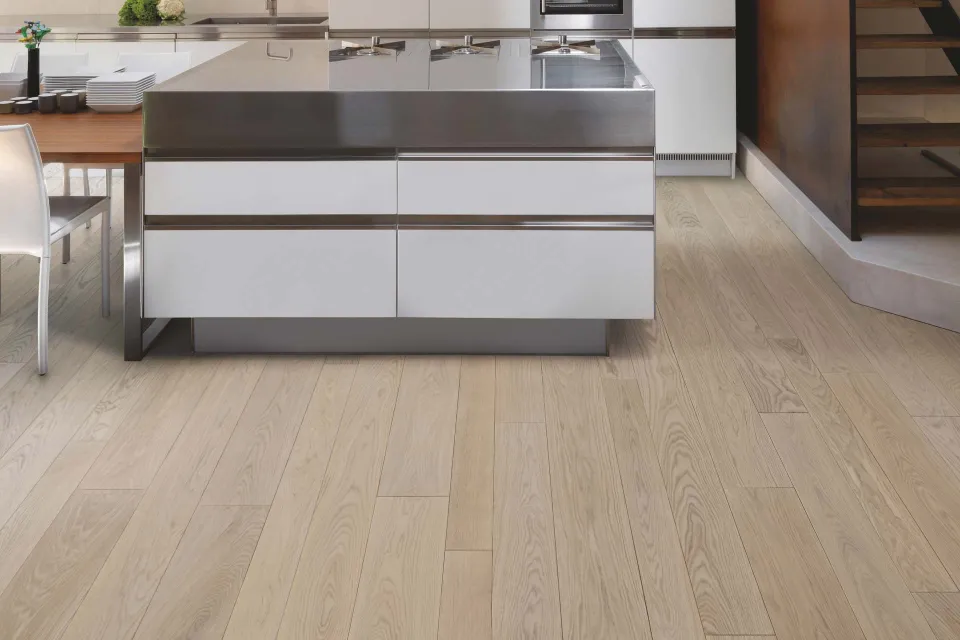
Vinyl Plank Flooring
We’ve come a long way since the days of sheet vinyl, but vinyl floors haven’t always had the best reputation. Now LVP is one of the most widely used types of flooring and is not only regarded as being of a high caliber.
Luxury vinyl planks (also referred to as vinyl plank flooring or LVP) are synthetic flooring planks that mimic the look, and sometimes feel, of real wood.
Luxury vinyl tile is essentially the same product, but cut to mimic the look of natural stones or ceramic tile.
Advantages
Vinyl flooring is incredibly resilient, resistant to water damage, and scratching. Vinyl sheet, tile, and plank are all easy to install. The tiles and planks are easily replaceable if they become damaged. There are many different wood species, finishes, and color options for vinyl flooring. When it comes to imitating the organic qualities present in hardwood, vinyl plank in particular is improving on its realism.
Downsides
If heavy items like furniture are dragged across vinyl flooring or if it is left idle for a long time, it may tear or dent. According to the quality of the product, vinyl cannot be installed in the path of direct sunlight without risking discoloration. Vinyl plank cannot be refinished. Vinyl sheet and tile cannot be repaired, only replaced. The average vinyl flooring lifespan is five to twenty years.
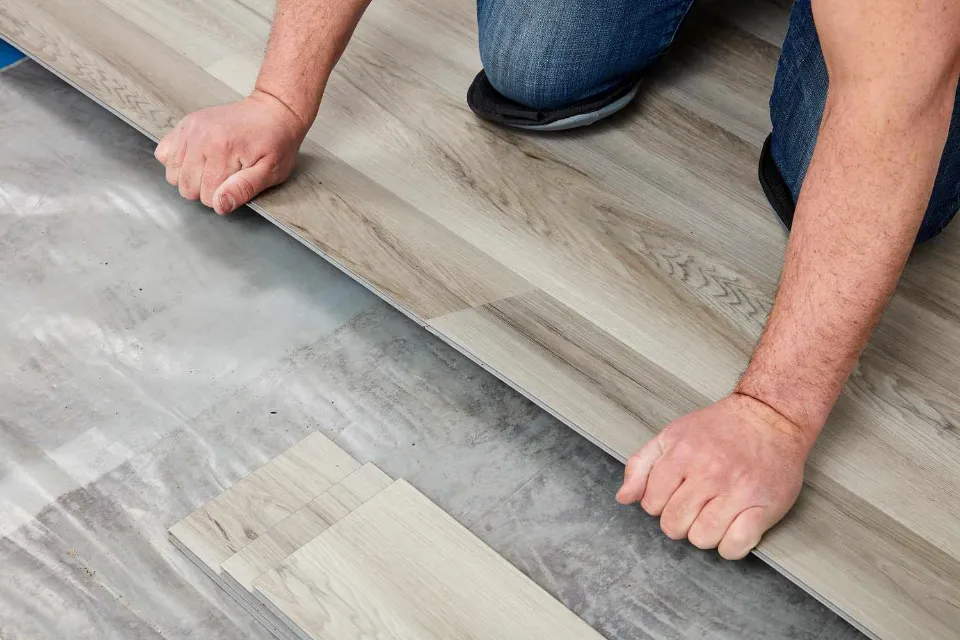
Engineered Hardwood Vs. Vinyl Plank Flooring
Below is a specific comparison about Engineered Wood vs. Vinyl Plank Flooring:
Look and Feel
With today’s sophisticated technologies, vinyl planks almost resemble real wood in appearance and feel. The colors, markings, patterns, and overall finishing of vinyl planks are unbelievably impressive.
Engineered hardwoods, on the other hand, are real wood, not just a high-end imitation of it. So, it is needless to say that they impart the warmth and antique ambiance of genuine solid hardwood flooring.
Durability
Vinyl plank flooring is a good choice if your home has pets or children. It is more resistant to dents and scratches. Additionally totally water-resistant, vinyl plank flooring is advantageous in humid and moist spaces. Due to the weight of the furniture and appliances, it is not completely impervious to damage and may dent or tear.
Due to the layers that make up engineered hardwood, it is relatively resistant to moisture and humidity. Although the top layer can show scratches because it is made of real wood, it is resilient to other types of damage like dings. Engineered hardwood can withstand moisture and won’t deteriorate like natural wood. Due to exposure to sunlight, both types are susceptible to fading over time.
Suggested reading: Types of flooring you can put over ceramic tile includes ceramic tiles, laminate flooring, vinyl flooring, carpet, epoxy coating, cork flooring, wood flooring, and new fired tile. But, why choose these floorings? Below will give specific reasons.
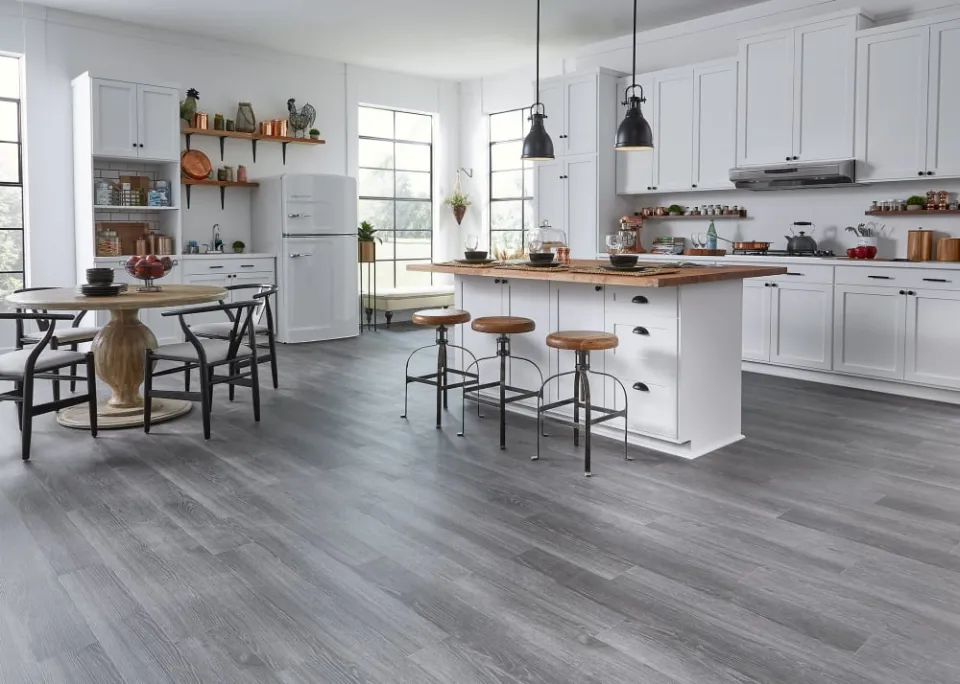
Cost
Flooring costs can add up. Tools and materials may be needed in addition during installation. In contrast to engineered hardwood, which costs about $8 per square foot, vinyl plank flooring can cost between $1 and $4 per square foot. As opposed to vinyl plank flooring, which can be easily installed by the homeowner, engineered hardwood installation can cost up to $10 per square foot. Because of this, vinyl flooring is preferred by many homeowners as being more economical.
Moisture Tolerance
Vinyl plank flooring, undoubtedly, is the best option for water-prone areas such as bathrooms or kitchens. So, vinyl plank flooring might be the best option for you if you have kids who run inside from the pool with their tiny wet feet.
Engineered hardwoods can, however, to some extent withstand moisture. Therefore, engineered hardwoods can also be a great flooring choice for you unless the area in which you want to replace the flooring is highly susceptible to moisture exposure.
Moreover, engineered hardwoods are designed to resist real wood’s tendency to undergo structural changes due to humidity and temperature to some degree. Because of the interlocking ply layers that produce a stable core, engineered hardwoods are less likely to expand and contract.
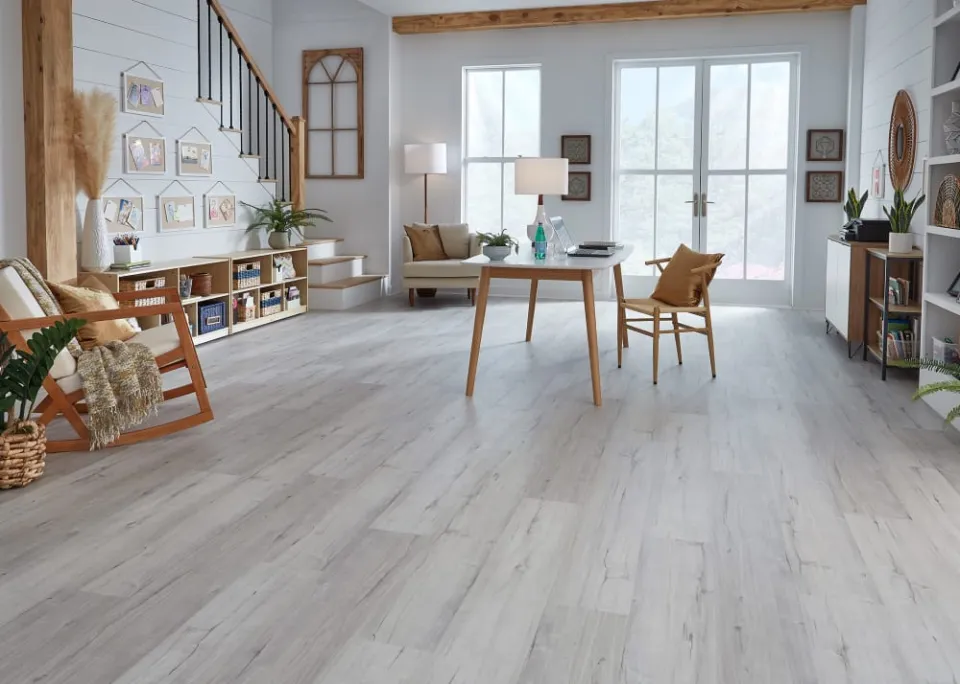
Cleaning and Maintenance
Cleaning and maintaining your floors takes a lot of work. Due to its complete water resistance, vinyl plank flooring is simple to maintain and clean. Daily cleaning is easy with a broom or even a vacuum cleaner. When it’s dirty or dusty, you can use a mop or a mild cleaner to clean it more thoroughly. Special maintenance is necessary for engineered hardwood. While you can still sweep or vacuum them, for more intense cleaning, use only a damp cloth and an engineered hardwood-specific cleaner.
Vinyl flooring needs little to no maintenance with proper care. Controlling their exposure to direct sunlight will help keep them from fading, but if they do become damaged, you can easily replace one plank at a time. Wood putty or a stain can be used to repair engineered hardwood. The manufacturer’s instructions can be followed to refinish engineered hardwood if additional repairs are necessary.
Installation
Vinyl planks are much easier to install than engineered hardwood planks. Vinyl planks are the best option if you decide to DIY your flooring next weekend.
Vinyl planks can be installed in two ways – floating floor installation and peel-and-stick. Installing vinyl planks with the floating floor technique is as simple as clicking the tongues and grooves of the planks together. Stick the planks to your floor if you’re using peel-and-stick flooring. Easy Peasy!
It takes more time and effort to install engineered hardwood in general. You can follow the floating floor or glue-down installation method or nail down or staple the planks together on the floor.
Since multiple ply layers beneath the wear layer act as a subfloor, you can easily glue down engineered hardwood planks atop concrete. One important piece of advice is to allow planks to adjust to room temperature before installing them.
With proper tools, skillset, and knowledge, installing engineered hardwood flooring by yourself is also a doable job. However, if you lack sufficient confidence, getting professional assistance is the best course of action.
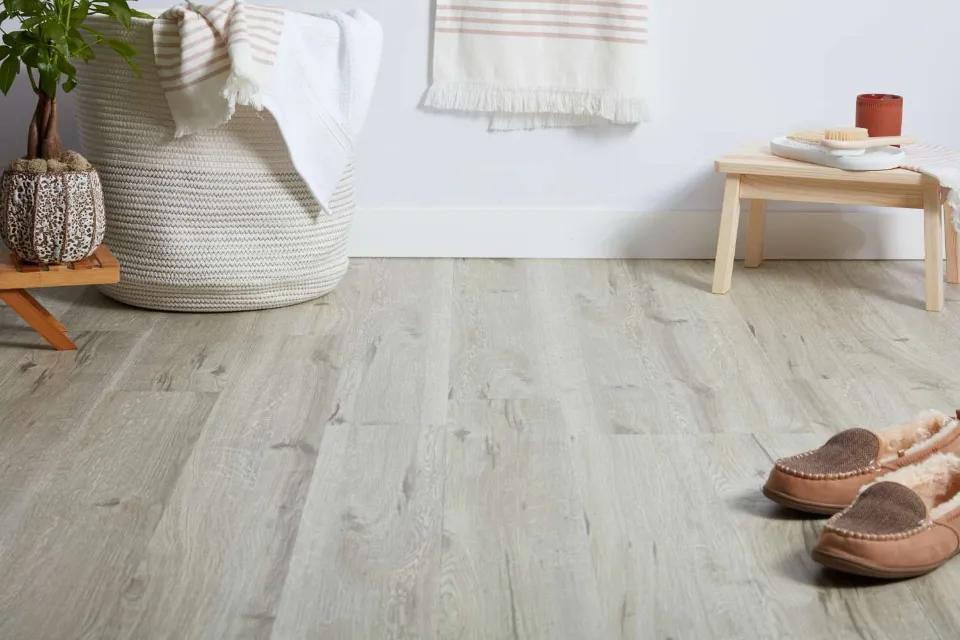
FAQs
Is LVP Better Than Engineered Hardwood?
Between LVP and engineered hardwood, LVP flooring is the most durable option for homeowners. Depending on the LVP planks you choose, it can last for up to 25 years.
Is Engineered Hardwood More Expensive Than LVP?
In comparison to engineered hardwood, vinyl plank flooring can cost anywhere between $1 and $4 per square foot. While installing engineered hardwood can cost up to $10 per square foot, putting in vinyl plank flooring is simple enough for the average homeowner.
Does LVP Add Value to Home?
The answer may surprise you – not only does LVP often help homes sell faster, but it can also lead to a higher sale price. The reasons LVP is such a well-liked option among home sellers and buyers are examined in more detail below.
Why is LVP So Popular?
One of the most widely used types of flooring for homes is LVP (luxury vinyl plank). And it’s easy to see why: it’s affordable and easy to maintain, and it has just the right texture and finish to complement any home’s aesthetic.
Engineered Hardwood Vs. Vinyl Plank Flooring: Which Material is Best?
You must provide answers to a few questions before deciding which material, given the application and design requirements, is best for your home. First, where are you going to put this flooring? Living room? Home office? This will assist you in deciding how to rank the merits of each flooring type. Just as the flooring requirements for a bathroom and a living room are very different from one another, so are those for a home office and a workout room.
Do you have to stick to a certain spending limit? When working within budgetary constraints, vinyl flooring appeals because of its low cost. Remember that affordable doesn’t necessarily mean cheap. With their realistic and elegant images, today’s vinyl flooring options are excellent.
Finally, how do you want your space to appear or feel? Do you prefer a modern aesthetic with a light wood appearance or a cozy, welcoming setting? The difficulty is that both materials have aesthetics to suit any design preference, whether it be modern or rustic. How do you decide?
If you have any questions, please leave a comment. My Prime Home tries to give you the best home improvement information. Don’t forget to share the post. Thank you for reading.
See also:
